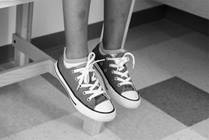Search Results
Viewing: 861-870 of 1469 | All

Condition
Non-Ossifying Fibromas
Non-ossifying fibromas (NOFs) are made of fibrous or “scar” tissue in the bone. They are not cancerous and they do not spread to other parts of the body or bone.

Blog
Antibiotic Allergies: Why Kids Should Be Tested to See if They’re Real
The most common symptoms are itchiness, a rash, difficulty breathing and swelling of the face, hands or feet. Less commonly, vomiting, diarrhea or light-headedness can be symptoms of an allergy.
Necrotizing Enterocolitis (NEC)
Necrotizing enterocolitis (NEC) is a disease of the bowel (intestine) of newborn infants.
Mumps
Mumps is an illness caused by a virus. The virus is spread through saliva, so you can catch mumps from being around someone who already has it.

Blog
Physiological Stress Response: It’s Not All in Your Head
Often the clinician may explain that your child’s symptoms are the result of stress, which can feel like you are being told “it’s all in their head.” It is important to know that it is not all in your child’s head.

Specialty
Emergency Medicine
The Division of Emergency Medicine at Nationwide Children’s Hospital staffs two Emergency Departments, seven Urgent Care locations and the Psychiatric Crisis Department. Our team is comprised of pediatric emergency medicine sub specialists, general pediatricians and nurse practitioners.

Condition
Tonsillitis
Tonsillitis refers to inflammation or infection of the tonsils. Treatment of tonsillitis typically requires a course of antibiotics.

Condition
Mayer-Rokitansky-Küster-Hauser Syndrome
Mayer-Rokitansky-Küster-Hauser Syndrome (MRKH) is a rare condition that affects girls and women. It means they are born without a fully developed uterus or vagina.

Blog
Lead Poisoning: Still a Public Health Risk
For more than 100 years, society has known that lead is very damaging to young children. It is frustrating that we still expose our most vulnerable to this poison, especially because it is completely preventable.
Little Leaguer's Elbow
Little leaguer’s elbow is an injury to the medial epicondylar growth plate of the inner elbow. The growth plate is a weak area. Injury to it occurs due to repeated stress.
